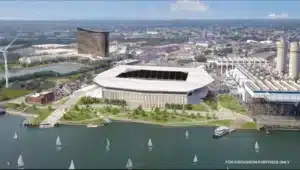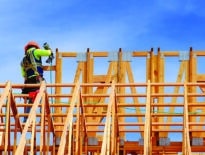
A rendering provided by The Kraft Group shows a potential new stadium in Everett for the New England Revolution proposed for the site of a decommissioned power plant on the Everett waterfront. Image courtesy of The Kraft Group
The next huge real estate development project in Everett appears to have a path forward following a Beacon Hill compromise that appears to placate Boston officials’ concerns.
A provision removing the biggest roadblock to building a New England Revolution was tucked into language of the annual state economic development bill released Tuesday. Legislators failed to pass the bill before their regular session ended in July.
The bill would remove the 43-acre former Mystic Generating Station power plant from Everett’s designated port area. It’s a key step that has to take place before city officials and state environmental regulators can sign off on The Kraft Group’s proposal to build a 25,000-seat arena and waterfront public park on the site.
An affiliate of Encore Boston Harbor casino owner Wynn Resorts bought the site for $25 million last March.
The Kraft Group will have five years to build the stadium, the bill stipulates. If not, the land would revert to being in the port area meaning it could only be used for “water-dependent” industrial uses.
“This language paves the way for the public process to move forward on a project that will help my community clean up a power plant site that has been a health and environmental hazard for decades. This will result in hundreds of millions of dollars in private investment, cleanup of a hazardous waste site, creating good paying union jobs, and opening our waterfront for the public to enjoy,” Everett state Sen. Sal DiDomenico said in a statement that thanked Senate President Karen Spilka and his fellow legislators.
DiDomenico, along with Everett Mayor Carlo DeMaria, long championed the stadium idea.
However, it faced strong opposition from Boston Mayor Michelle Wu over the traffic it would generate in Charlestown’s Sullivan Square. The site doesn’t have strong public transit access, but the MBTA said it hopes to extend its Silver Line bus rapid transit line from Chelsea to the area in the future.
“I am grateful to the Legislature for recognizing the need for Boston to be included in discussions of this major proposal,” Wu said in a statement issued today. “Thank you to our labor, climate, and transportation partners for their thoughtful advocacy through the legislative process. We look forward to learning the details of this proposal and working on behalf of Boston residents to represent community needs at this site.”
The bill requires the MBTA to come up with a plan to serve the stadium site with public transit no later than March 1. The Kraft Group must also have to negotiate community impact deals with both Boston and Everett by Dec. 31, 2025 or face arbitration, the bill says.
If approved by state legislators, and if built, a New England Revolution soccer stadium would add a third major real estate development to Everett’s once-industrial Lower Broadway neighborhood. In addition to the Encore Boston Harbor casino, the area is also in line for a 7.2 million-square-foot mixed-use project by The Davis Companies, called the “Everett Docklands Innovation District.” A casino expansion plan was shelved earlier this year.
With the Legislature done with its regular session, though, lawmakers could be forced to return to the State House en masse if any dissent emerges during its so-called “informal sessions.” Opposition from any single lawmaker during informal sessions can halt a bill.






